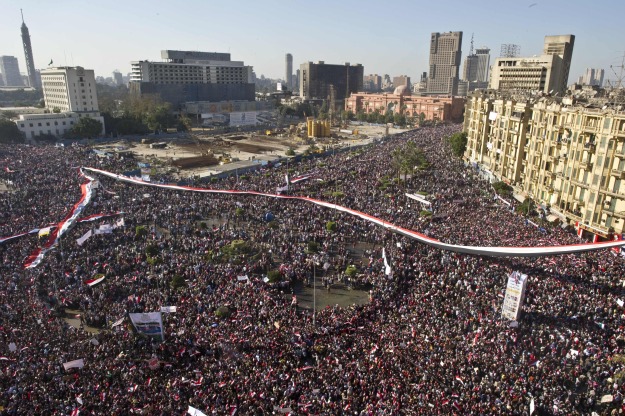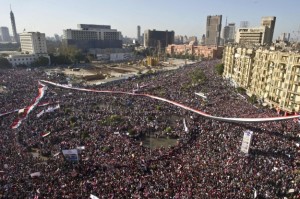Islamic Awakening: People in Arab States Not after US-Style Democracy

 The West was wrong if it expected to see US-style democracy in the region after the recent popular uprisings which swept the Middle-East and North Africa, a report by an Israeli daily said.
The West was wrong if it expected to see US-style democracy in the region after the recent popular uprisings which swept the Middle-East and North Africa, a report by an Israeli daily said.
In a report published by Israeli daily Haaretz, Zvi Bar’el said, “Underlying the upheavals in Arab countries is a revolution of consciousness, with citizens recognizing their role in the running of their states. But the West misread the map if it expected to see US-style democracies there.”
The report, titled ‘Arab democracy looks different’, reviewed developments in Arab and regional countries since the start of popular uprisings in North Africa and the Middle-East, which broke out on December 17, 2010, when Mohamed Bouazizi, a young university graduate, set himself on fire after municipal officials confiscated the vegetable cart with which he earned a meager living.
“The demand for democracy was interpreted differently in each of the countries. The composition of each population – such as the gap between the respective residents of Benghazi and Tripoli and the western part of the country (in the case of Libya), or the rivalry between southerners and northerners and among various tribes (in the case of Yemen) – defined the results that were hoped for in each of the countries,” the report said.
Within these definitions lies the frustration of the people who coined the term “Arab Spring” in the West (by the way, the revolutions, it is worth noting, began in the winter), who envisioned a pan-Arab revolution that would give rise to American-style democracy. The ambitions of the revolutionaries in the Arab countries, who know better than anyone else which democracy is best suited to them, are more specific.
“Arab Spring” rests on a collective Western memory formed on the 1848 “Spring of Nations” that began to shape and define national perceptions in Europe. Its continuation was a cold colonialist winter in which Arab and other countries were occupied, the report noted.
“The Arab states of 2011 did not wake up to a national revolution. They had already implemented that in the previous century. Possibly it would be more accurate to define the current revolutions as a critical transitional stage from alienation to citizens’ identification with their countries,” the report said.
Not wars of independence being fought against colonial occupation, but rather an effort to assume ownership over the countries left by colonialists and their successors, and by dictators that were later deposed, Bar’el underlined.
“The term “Arab” in the phrase “Arab Spring” is also far from precise. Four Arab countries ? Tunisia, Egypt, Libya and Yemen ? experienced the toppling of a regime. In Bahrain there were indeed demonstrations, but no regime change. Iraq went through a revolution of governance. The other Arab countries have remained in the position of onlookers.”
It would, however, be a mistake to examine the effect of the revolutions only through the narrow lens of the changes – or on-changes – in each of the countries. The consciousness of an “eternity of the regime,” as had been instilled in most of the Arab countries, is what has dissipated, the report said.
“Dynastic regimes, such as in Saudi Arabia, Kuwait or Qatar, are now aware of the dangerous potential in the power of the people. Some of them have hastened to adopt reforms or to buy quiet with a lot of money,” the report said.
The “democracy” in those countries has garbed itself in a different cloth. Now the patronage cannot stop at only ensuring an income and a better distribution of the oil money among the public, the report added.
The writer added that the concept of “people’s representation” has increasingly entered the lexicon of public discourse. The revolutions, then, cannot be examined only by the quality of democracy to which they have given rise, nor by the crushing of the fear-inducing regime.
“The revolution of consciousness will no doubt also have many implications for the foreign policy of those countries, inter-Arab relations and relations with the West in general and the United States in particular. This change in consciousness is already bringing about a new perception in the West: It is beginning to recognize that alliances between its governments and Arab rulers will henceforth have to rely on that gigantic unknown called public opinion.”







